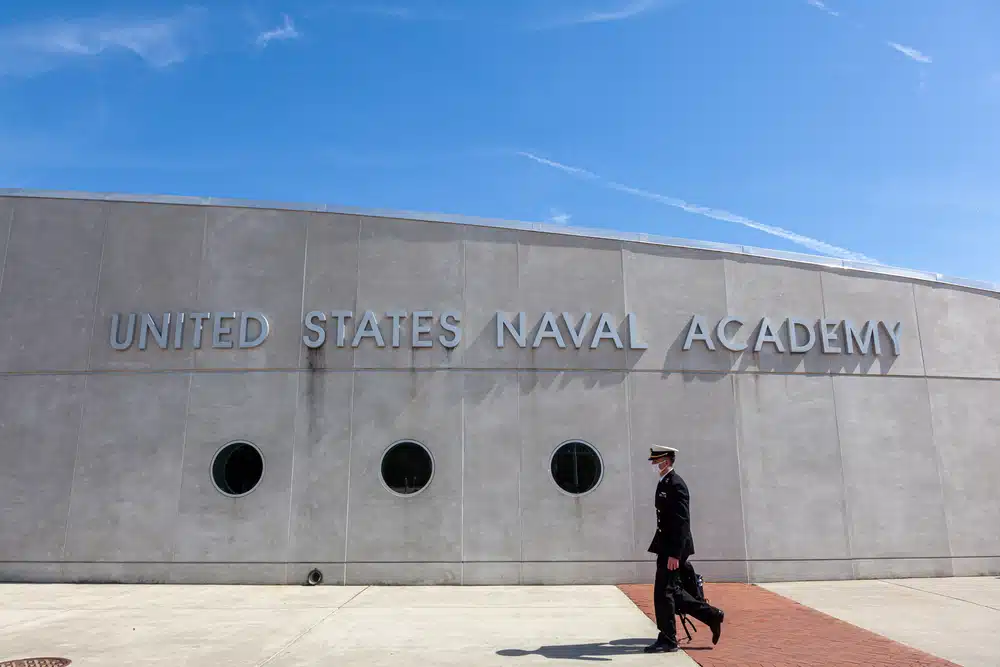How to Prepare for Your Naval Academy Application
The United States Naval Academy, based in Annapolis, Maryland, is one of the most prestigious military academies in the country, producing some of America’s finest naval and marine officers. With its rigorous admission process, preparing an application can be daunting. However, with the right approach, you can increase your chances of success. This article will guide you through each stage of the Naval Academy application process.
Understanding the Naval Academy Application Process
The Role of the Naval Academy
The Naval Academy’s mission is to develop midshipmen morally, mentally, and physically and to imbue them with the highest ideals of duty, honor, and loyalty. It aims to provide graduates who are dedicated to a career in naval service and have potential for future development in mind and character. As such, its application process is designed to identify candidates who exemplify these qualities.
When it comes to understanding the role of the Naval Academy, it is important to recognize the significance of the institution’s commitment to shaping well-rounded individuals. The Academy’s focus on moral, mental, and physical development ensures that future midshipmen are equipped with the necessary skills and values to serve their country with honor and distinction.
Through a rigorous academic curriculum, extensive physical training, and a strong emphasis on character development, the Naval Academy creates an environment that fosters leadership, critical thinking, and a deep sense of responsibility. Graduates of the Academy go on to become officers in the United States Navy or Marine Corps, taking on leadership roles and making significant contributions to the nation’s defense.
Key Dates and Deadlines for Application
The application process for the Naval Academy typically begins in the spring of a student’s junior year of high school. From April 1st, the Academy’s Admissions Office starts accepting Preliminary Applications for the following year’s class. The deadline for submitting completed applications, including nominations, is usually at the end of January of the senior year.
During this time, prospective candidates are encouraged to gather all the necessary documents and information required for the application. This includes academic transcripts, standardized test scores, letters of recommendation, and a personal statement. It is important for applicants to carefully review the application requirements and ensure that all materials are submitted before the deadline.
Once the application is submitted, the Admissions Office begins the comprehensive review process. This involves evaluating each candidate’s academic achievements, extracurricular activities, leadership potential, and physical fitness. Additionally, candidates must also obtain a nomination from a member of Congress or other authorized nominating sources.
Throughout the application process, the Naval Academy seeks to identify individuals who not only possess strong academic abilities but also demonstrate a genuine commitment to serving their country. The selection process is highly competitive, with a limited number of spots available each year. Therefore, it is crucial for applicants to showcase their unique qualities, experiences, and aspirations that align with the Naval Academy’s mission and values.
Once the application review is complete, selected candidates are invited for a personal interview and a physical fitness test. These final stages of the application process provide an opportunity for the Academy to assess the candidate’s suitability for the demanding and challenging environment of the Naval Academy.
In conclusion, the Naval Academy’s application process is a comprehensive and thorough evaluation of a candidate’s academic, physical, and personal qualifications. It is designed to identify individuals who have the potential to become successful leaders in the Navy or Marine Corps. Aspiring midshipmen must demonstrate not only academic excellence but also a strong sense of duty, honor, and loyalty to be considered for admission to this prestigious institution.
Evaluating Your Eligibility for the Naval Academy
Age and Citizenship Requirements
The Naval Academy has specific requirements regarding age and citizenship for entry. Candidates must be at least 17 years old and not past their 23rd birthday on July 1st of the year they would enter the Academy. This age range ensures that candidates have reached a level of maturity and readiness to undertake the rigorous training and responsibilities that come with being a midshipman at the Naval Academy.
Furthermore, they must be U.S. citizens, except for a limited number of international students who are nominated by their countries. This requirement ensures that the candidates have a strong sense of loyalty and commitment to the United States and its values, which are fundamental to the mission of the Naval Academy.
Being a U.S. citizen also allows candidates to fully participate in the various training exercises and activities that are an integral part of the Naval Academy experience. It ensures that they can fully immerse themselves in the culture and traditions of the U.S. Navy and Marine Corps, which they will be representing as future officers.
Physical and Medical Criteria
Besides age and citizenship, applicants must also meet physical and medical standards to be considered for admission. This is because the Naval Academy requires its midshipmen to be physically fit and capable of meeting the demanding physical challenges they will face during their training and future military service.
Applicants must pass a medical exam conducted by the Department of Defense Medical Review Board. This exam ensures that candidates are in good health and free from any medical conditions that could hinder their ability to perform their duties as midshipmen and future officers.
In addition to the medical exam, candidates must also complete the Candidate Fitness Assessment (CFA), which consists of six physical fitness events. These events include a one-mile run, a shuttle run, a basketball throw, a kneeling basketball throw, a push-up event, and a curl-up event. The CFA assesses the candidate’s overall physical fitness and determines their ability to meet the physical demands of the Naval Academy.
By evaluating the physical and medical criteria of applicants, the Naval Academy ensures that only those who are physically capable and healthy enough to endure the rigorous training and demanding responsibilities of a midshipman are admitted.
Academic Qualifications
Academic excellence is also a requisite for admission to the Naval Academy. The Academy seeks candidates who have demonstrated a strong commitment to their education and have excelled academically in high school.
Applicants should have a strong high school record, including coursework in math and science. This emphasis on math and science is because these subjects are crucial for the technical and scientific knowledge that midshipmen will need in their future careers as naval officers.
Moreover, standardized test scores like the SAT or ACT are significant factors in the admissions decision. These test scores provide a standardized measure of a candidate’s academic abilities and potential for success at the Naval Academy.
Academic qualifications are important because they indicate a candidate’s ability to handle the rigorous academic curriculum at the Naval Academy. The Academy offers a comprehensive education that combines military training with a strong emphasis on science, technology, engineering, and mathematics (STEM) disciplines. Therefore, candidates with a strong academic background are more likely to thrive in this challenging environment.
By evaluating the academic qualifications of applicants, the Naval Academy ensures that only those who have the intellectual capacity and dedication to excel academically are admitted. This ensures that the Academy produces well-rounded officers who are not only physically fit but also intellectually capable of leading and making critical decisions in complex military situations.
Preparing Your Application Package
Crafting a Compelling Personal Statement
Your personal statement is a critical component of your Naval Academy application; it’s your chance to express who you are and why you aspire to become a naval officer. You should be authentic, showing your passion for service and commitment to leadership. The statement should also highlight your strengths and how they align with the Naval Academy’s mission.
When crafting your personal statement, it’s important to delve deep into your experiences and reflect on the moments that have shaped your desire to serve in the Navy. Share stories that demonstrate your dedication to leadership and your ability to overcome challenges. Perhaps you can discuss a time when you took charge of a difficult situation and successfully led a team to achieve a common goal. By providing specific examples, you can paint a vivid picture of your character and showcase your potential as a future naval officer.
Furthermore, it’s essential to convey your genuine enthusiasm for the Navy and its core values. Explain why you believe in the importance of honor, courage, and commitment and how these values align with your own personal beliefs. By demonstrating your passion for service, you can convince the admissions committee that you are truly dedicated to the Naval Academy’s mission.
Gathering Letters of Recommendation
Letters of recommendation from teachers, mentors, or community leaders can strengthen your application, providing evidence of your character and abilities. It is important to choose recommenders who know you well and can attest to your leadership and commitment.
When selecting individuals to write your letters of recommendation, consider those who have witnessed your growth and development over a significant period of time. Teachers who have seen your academic progress, mentors who have guided you through extracurricular activities, or community leaders who have observed your involvement in service projects can all provide valuable insights into your character and potential as a naval officer.
When requesting letters of recommendation, be sure to provide your recommenders with a clear understanding of the Naval Academy’s mission and the qualities they should highlight in their letters. By guiding them in this way, you can ensure that their recommendations align with your overall application and strengthen your candidacy.
Completing the Candidate Fitness Assessment
The Candidate Fitness Assessment (CFA) is an important evaluation tool measuring your physical readiness for the Academy’s demanding training. You’ll need to showcase strength, flexibility, and endurance in the six events: basketball throw, pull-ups/flexed-arm hang, shuttle run, sit-ups, push-ups, and a one-mile run.
Preparing for the CFA requires a disciplined training regimen that focuses on building both strength and endurance. It’s important to engage in regular physical exercise and practice the specific events included in the assessment. By dedicating yourself to a consistent workout routine, you can improve your performance and demonstrate your commitment to physical fitness.
Additionally, consider seeking guidance from a coach or trainer who can provide expert advice on the proper form and technique for each event. They can help you develop a personalized training plan that targets your specific areas of improvement, ensuring that you are well-prepared for the CFA.
Remember, the CFA is not only a test of physical fitness but also a demonstration of your mental resilience and determination. Push yourself to exceed your own expectations and embrace the challenges that come with each event. By showcasing your physical prowess and mental fortitude, you can impress the admissions committee and prove that you have what it takes to succeed at the Naval Academy.
Navigating the Nomination Process
Applying to the Naval Academy is an exciting and challenging endeavor. One unique aspect of this application process is the need for a nomination from a governmental official. This nomination serves as a testament to your character, leadership potential, and academic achievements. It is a way for the Naval Academy to ensure that only the most qualified and deserving candidates are admitted.
Securing a Nomination from a Congressional Representative
Most applicants to the Naval Academy seek a nomination from a U.S. Representative or U.S. Senator. This is often the most common and straightforward route to securing a nomination. However, it is crucial to start this process early, as it involves a separate application and, sometimes, an interview.
When seeking a nomination from a congressional representative, it is essential to research and identify the specific requirements and deadlines of each office. Some representatives may have additional criteria or specific application procedures that you need to follow. It is advisable to reach out to their offices and establish a line of communication to ensure you have all the necessary information.
Once you have identified the congressional representative you wish to seek a nomination from, you will need to submit an application. This application typically includes personal information, academic achievements, extracurricular activities, and an essay highlighting your motivation and commitment to serving in the Naval Academy. It is important to put your best foot forward in this application, as it will be reviewed by the representative’s selection committee.
In some cases, the nomination process may also involve an interview. This interview is an opportunity for you to showcase your leadership skills, articulate your goals, and demonstrate why you are a deserving candidate for the Naval Academy. It is crucial to prepare for this interview by researching the representative’s stance on various issues and being ready to discuss your own perspectives.
Alternative Nomination Sources
If securing a congressional nomination is not possible, do not despair. There are alternative nomination sources available. These options may have different requirements and deadlines, so it is important to research and understand each one accordingly.
One alternative nomination source is the Vice President of the United States. The Vice President has the authority to nominate candidates for the Naval Academy. While this option may be less common, it is worth exploring if you believe you have a strong case for consideration.
Another alternative nomination source is the Secretary of the Navy. The Secretary of the Navy also has the authority to nominate candidates for the Naval Academy. This option may have its own set of requirements and procedures, so it is crucial to research and understand them thoroughly.
Regardless of the nomination source you pursue, it is important to remember that securing a nomination is just one step in the overall application process. It is a significant achievement, but it does not guarantee admission to the Naval Academy. The nomination serves as a testament to your potential, but you must continue to excel academically, physically, and morally throughout the remainder of the application process.
As you navigate the nomination process, remember to stay organized, proactive, and persistent. Seek guidance from your high school counselors, teachers, and mentors who can provide valuable insights and support. With dedication and determination, you can increase your chances of securing a nomination and ultimately fulfilling your dream of attending the prestigious Naval Academy.
Preparing for the Interview
Common Interview Questions
The Naval Academy uses interviews to further assess candidates’ fit. Be prepared to answer questions about your understanding of Naval life, your motivations for joining, and how you have demonstrated leadership or overcome challenges in your life.
Tips for a Successful Interview
To succeed in the interview, demonstrate your knowledge of the Naval Academy and enthusiasm for a military career. Focus on clear, concise answers that show thoughtfulness and maturity. And remember, it’s not just about answering the questions – show interest by asking some of your own about life at the Academy or the Naval career you’re pursuing.
Approaching the Naval Academy application process can seem overwhelming, but with careful preparation and dedication, you stand a great chance. May your journey to joining the ranks of the Navy’s best and brightest begin.
Conclusion
In conclusion, preparing for your Naval Academy application is a challenging but rewarding journey. The process requires a deep commitment to academic excellence, physical fitness, and demonstrating leadership qualities. This comprehensive guide has outlined key steps, from understanding the Academy’s mission to securing nominations and excelling in interviews.
With determination and unwavering commitment to excellence, you can navigate this intricate process and set sail toward a future of service, leadership, and distinction in the U.S. Navy. Your journey begins now, and the nation awaits the contributions of its finest and brightest.
Having all the necessary information is important before choosing any course of action. AdmissionSight is always here to assist you with any questions or concerns. We have more than ten years of expertise assisting students in successfully navigating the challenging admissions process.
Consult with AdmissionSight and find out what we can do to help you get into the school of your choice by ensuring that you are sufficiently aware and well-prepared for the application process.










































